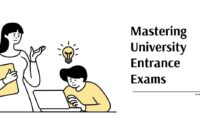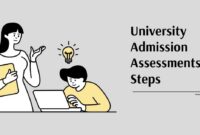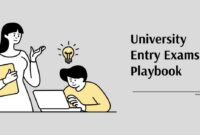Picture this: Sarah sits in her Year 12 classroom, palms sweating as her teacher announces the upcoming ATAR calculations. Like thousands of Australian students before her, she’s about to face one of the most important academic challenges of her life – university entrance exams. But here’s the thing: with the right preparation and understanding, you can turn this challenge into your stepping stone to success.
University entrance exams might seem overwhelming, but they’re simply tools that help universities understand your academic abilities. Whether you’re aiming for medicine, engineering, or arts, these assessments play a crucial role in shaping your future. Let’s explore everything you need to know about navigating this important milestone in your educational journey.
Understanding University Entrance Exams in Australia
University admission tests in Australia work differently from many other countries, and understanding this system is your first step toward success. The process involves multiple components that work together to create a comprehensive picture of your academic readiness.
1. The ATAR System: Your Gateway to Higher Education
The Australian Tertiary Admission Rank (ATAR) forms the backbone of university admissions across the country. This ranking system converts your Year 12 results into a percentile ranking, showing how you performed compared to other students in your state or territory.
Your ATAR isn’t just a single test score – it’s calculated from your best subjects during Year 12. Each state has slightly different approaches, but the core principle remains consistent: demonstrating sustained academic performance throughout your final year of high school.
The beauty of the ATAR system lies in its comprehensive nature. Unlike standardized admission tests in other countries that rely on a single exam day, your ATAR reflects months of consistent effort and improvement. This means you have multiple opportunities to showcase your abilities rather than risking everything on one test day.
2. State-Specific Assessment Systems
Each Australian state and territory operates its own assessment system, though they all contribute to ATAR calculations:
- New South Wales: Higher School Certificate (HSC)
- Victoria: Victorian Certificate of Education (VCE)
- Queensland: Queensland Certificate of Education (QCE)
- Western Australia: Western Australian Certificate of Education (WACE)
- South Australia: South Australian Certificate of Education (SACE)
- Tasmania: Tasmanian Certificate of Education (TCE)
- Northern Territory: Northern Territory Certificate of Education and Training (NTCET)
- Australian Capital Territory: ACT Senior Secondary Certificate
Understanding your state’s specific requirements helps you focus your preparation efforts effectively.
3. Beyond the ATAR: Additional Entry Requirements
Many university programs require more than just a competitive ATAR score. These additional university application assessments might include:
- Portfolio submissions for creative disciplines
- Interviews for competitive programs
- Prerequisite subjects for specific courses
- Work experience requirements
- Personal statements or essays
Types of Higher Education Entry Tests
College entrance exams in Australia extend beyond the traditional ATAR system, especially for specific fields and competitive programs. Understanding these different assessment types helps you prepare comprehensively for your chosen pathway.
1. UCAT ANZ: Opening Doors to Medicine and Dentistry
The University Clinical Aptitude Test for Australia and New Zealand (UCAT ANZ) represents one of the most challenging academic aptitude tests you might encounter. This computer-based assessment evaluates your cognitive abilities, attitudes, critical thinking, and logical reasoning skills.
The UCAT ANZ consists of five subtests: Verbal Reasoning, Decision Making, Quantitative Reasoning, Abstract Reasoning, and Situational Judgement. Each section tests different cognitive skills essential for success in healthcare professions.
What makes UCAT ANZ unique is its focus on aptitude rather than curriculum knowledge. You can’t simply memorize facts to succeed – instead, you need to develop problem-solving strategies and time management skills.
2. GAMSAT: The Graduate Medical School Admission Test
For students pursuing graduate-entry medical programs, the Graduate Medical School Admission Test (GAMSAT) serves as a critical gateway. This exam tests reasoning in biological and physical sciences, written communication, and humanities and social sciences.
GAMSAT requires a different preparation approach compared to undergraduate assessments. Since it’s designed for university graduates, it assumes a higher level of scientific knowledge and analytical thinking.
3. LSAT: Law School Admission Test
Students interested in Juris Doctor programs often need to complete the Law School Admission Test (LSAT). This standardized test measures reading comprehension, analytical reasoning, and logical reasoning skills crucial for legal studies.
The LSAT challenges you to think like a lawyer before you even begin law school. It tests your ability to analyze complex arguments, identify logical flaws, and draw reasonable conclusions from given information.
4. Program-Specific Assessments
Many specialized university programs conduct their own university selection exams:
- Architecture: Portfolio reviews and spatial reasoning tests
- Music: Auditions and music theory assessments
- Teaching: Literacy and numeracy tests (LANTITE)
- Aviation: Pilot aptitude tests and medical examinations
- Art and Design: Portfolio submissions and creative challenges
Preparing for College Admission Preparation
Effective college admission preparation requires strategic planning and consistent effort over time. The key lies in understanding that preparation isn’t just about studying harder – it’s about studying smarter and developing the right skills for success.
1. Creating Your Study Timeline
Start your preparation early – ideally, begin serious preparation at least 12 months before your target exam dates. This timeline allows you to:
- Identify your strengths and weaknesses
- Develop comprehensive study plans
- Complete multiple practice tests
- Refine your test-taking strategies
- Build confidence through consistent practice
Break down your preparation into manageable phases. Spend the first few months understanding the exam format and requirements, then gradually increase practice intensity as exam dates approach.
2. Understanding Exam Formats and Requirements
Each higher education admission process has unique characteristics that require specific preparation approaches. Spend time thoroughly understanding:
- Question types and formats
- Time limits and pacing requirements
- Scoring systems and minimum requirements
- Registration deadlines and procedures
- Available practice resources
This foundational knowledge helps you create targeted preparation strategies rather than using generic study approaches that might not address specific exam requirements.
3. Developing Effective Study Habits
Successful exam preparation relies on consistent, focused study habits rather than intensive cramming sessions. Consider these approaches:
Active Learning Techniques: Engage with material through practice questions, explaining concepts to others, and creating summary notes. Passive reading rarely leads to deep understanding or retention.
Regular Practice Testing: Complete full-length practice exams under timed conditions regularly. This builds stamina and helps identify areas requiring additional attention.
Review and Reflection: After each practice session, spend time analyzing your performance. Identify patterns in your mistakes and develop strategies to address recurring issues.
Test-Taking Strategies for University Selection Exams
Mastering test-taking strategies can significantly improve your performance, regardless of your subject knowledge level. These techniques help you maximize your potential during actual exam situations.
1. Time Management Techniques
Effective time management during exams can make the difference between success and disappointment. Develop these essential skills:
Pre-Exam Planning: Before starting any section, quickly scan through all questions to understand the scope and difficulty level. This overview helps you allocate time appropriately across different question types.
Pacing Strategies: Calculate how much time you can spend on each question or section. Stick to these time limits during practice sessions to build automatic pacing habits.
Strategic Question Selection: In exams where you can choose which questions to answer, start with topics you’re most confident about. This builds momentum and ensures you secure points from your strongest areas first.
2. Stress Management During Exams
Managing exam anxiety is crucial for optimal performance. Even well-prepared students can underperform due to excessive stress or nervousness.
Breathing Techniques: Practice deep breathing exercises that you can use during exams. Controlled breathing helps maintain focus and reduces physiological stress responses.
Positive Self-Talk: Develop encouraging internal dialogue to use during challenging moments. Replace negative thoughts with constructive, confidence-building statements.
Preparation Confidence: Thorough preparation naturally reduces anxiety. When you know you’ve done everything possible to prepare, you can approach exams with greater confidence.
3. Strategic Guessing and Question Approach
Understanding how to approach different question types strategically improves your overall performance:
Multiple Choice Strategy: When unsure, eliminate obviously incorrect options first. This increases your probability of selecting the correct answer even when guessing.
Essay Writing Approach: Structure your essays with clear introductions, body paragraphs, and conclusions. Even under time pressure, maintaining organization helps communicate your ideas effectively.
Mathematical Problem Solving: Show your working even for incorrect final answers. Many exams award partial credit for correct approaches, even with calculation errors.
Overcoming Common Challenges in Higher Education Admission Process
Every student faces unique challenges during the higher education admission process. Recognizing these common obstacles and developing strategies to overcome them increases your chances of success.
1. Managing Academic Pressure and Expectations
The pressure to achieve high scores can become overwhelming, especially when family expectations, peer competition, and personal goals create additional stress.
Setting Realistic Goals: Establish achievable targets based on your current performance level and improvement trajectory. Unrealistic expectations often lead to disappointment and reduced motivation.
Balancing Perfectionism: Strive for excellence while accepting that perfection isn’t always necessary or possible. Focus on consistent improvement rather than flawless performance.
Communication with Support Networks: Regularly discuss your concerns and progress with teachers, family, and friends. External perspectives often provide valuable insights and emotional support.
2. Dealing with Test Anxiety
Test anxiety affects many students, regardless of their preparation level. Learning to manage these feelings improves both your exam performance and overall well-being.
Gradual Exposure: Regularly practice under exam-like conditions to reduce unfamiliarity and associated anxiety. The more comfortable you become with exam formats, the less anxious you’ll feel.
Relaxation Techniques: Develop a toolkit of relaxation strategies including progressive muscle relaxation, visualization, and mindfulness exercises.
Professional Support: Don’t hesitate to seek help from school counselors or mental health professionals if anxiety significantly impacts your daily life or exam performance.
3. Maintaining Motivation Throughout Preparation
Long-term exam preparation can become monotonous, leading to decreased motivation and inconsistent study habits.
Celebrating Small Wins: Acknowledge improvements in practice scores, mastery of difficult concepts, or consistent study streaks. These small celebrations maintain momentum during challenging periods.
Varying Study Approaches: Change your study environment, techniques, and materials regularly to maintain interest and engagement. Monotonous preparation often leads to decreased effectiveness.
Connecting to Future Goals: Regularly remind yourself why you’re working toward university admission. Visualizing your future career and educational experiences helps maintain long-term motivation.
Resources and Support Systems
Success in university application assessments often depends on utilizing available resources effectively. Australia offers numerous support systems designed to help students navigate this challenging period.
1. School-Based Support Services
Your school provides the foundation for exam preparation and should be your primary resource for guidance and support.
Subject Teachers: Build strong relationships with your teachers and seek regular feedback on your progress. They understand curriculum requirements and can provide targeted advice for improvement.
Career Counselors: School counselors offer valuable insights into university programs, admission requirements, and alternative pathways. They can help you make informed decisions about your future educational direction.
Study Groups: Collaborate with classmates to share knowledge, discuss difficult concepts, and maintain motivation. Peer support often provides unique perspectives and learning opportunities.
2. Online Learning Platforms and Practice Materials
Numerous online resources supplement your school-based learning and provide additional practice opportunities.
Official Practice Tests: Always prioritize official practice materials from exam bodies. These resources most accurately reflect actual exam formats and difficulty levels.
Educational Websites: Explore reputable educational platforms offering subject-specific content and practice exercises. Many provide detailed explanations and progress tracking features.
Video Learning: Utilize educational videos to understand complex concepts through visual and auditory learning. Many students find video explanations more engaging than traditional textbooks.
3. Professional Tutoring and Coaching Services
Consider professional support when you need additional assistance beyond what your school can provide.
Subject-Specific Tutoring: Invest in tutoring for subjects where you’re struggling or want to achieve exceptional results. One-on-one attention often accelerates learning and improvement.
Exam Technique Coaching: Some professionals specialize in teaching test-taking strategies and exam techniques. This coaching can be particularly valuable for standardized tests like UCAT ANZ or GAMSAT.
Study Skills Development: Professional study skills coaching helps you develop efficient learning strategies, time management techniques, and organizational systems.
Planning Your Path Forward
As you approach university entrance exams, remember that these assessments represent opportunities rather than obstacles. With proper preparation, strategic thinking, and consistent effort, you can achieve your academic goals and secure admission to your preferred university programs.
Your journey toward higher education is unique, and there’s no single “correct” path to success. Some students excel through intensive preparation, while others succeed through consistent, steady progress. The key is finding approaches that work for your learning style, circumstances, and goals.
Remember that university admission is just the beginning of your educational journey. The skills you develop during exam preparation – critical thinking, time management, stress management, and resilience – will serve you well throughout your university studies and future career.
Take time to research your target universities and programs thoroughly. Understanding specific college entry requirements helps you focus your preparation efforts on the most important areas. Don’t forget to explore alternative pathways, including foundation programs, bridging courses, and portfolio entry options.
Finally, maintain perspective throughout this process. While university entrance exams are important, they don’t define your worth or determine your entire future. Many successful people have taken non-traditional educational paths, and there are always opportunities to redirect your journey if needed.
Your dedication to understanding and preparing for university entrance exams demonstrates maturity and commitment to your future. Trust in your preparation, stay focused on your goals, and remember that every challenge you overcome makes you stronger and more prepared for future success.
The path ahead may seem challenging, but with the right preparation and mindset, you’re well-equipped to succeed. Your future awaits, and these exams are simply stepping stones toward achieving your academic and career aspirations.



